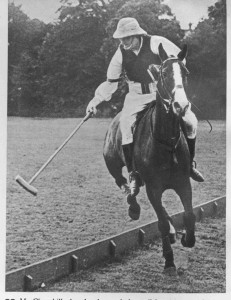Churchill on Horses
 “We need a horseman for our next president,” writes Gary Hodgson in the Fort Morgan Times, who then goes on to quote “the famous reining champion, team roper and all around cowboy…Sir Winston Churchill,” who allegedly said: “There is something about the outside of a horse that is good for the inside of a man.”
“We need a horseman for our next president,” writes Gary Hodgson in the Fort Morgan Times, who then goes on to quote “the famous reining champion, team roper and all around cowboy…Sir Winston Churchill,” who allegedly said: “There is something about the outside of a horse that is good for the inside of a man.”Unless Mr. Hodgson has found a new attribution, that charmer is not Churchill’s. It’s listed in the “Red Herrings” appendix in Churchill by Himself, page 575, with this note:
Repeatedly attributed to everyone from Woodrow Wilson’s physician to Ronald Reagan. “Clergyman Henry Ward Beecher (1813–87) is one person to whom the thought was attributed in his time. Oliver Wendell Holmes is another…Verdict: Long-time male equestrian wisdom.” –Ralph Keyes, The Quote Verifier, 91.
Mr. Hodgson mentions another line of Churchill’s about horses (from Churchill’s autobiography, My Early Life), which readers might enjoy in its entirety:
And here I say to parents, especially to wealthy parents, “Don’t give your son money. As far as you can afford it, give him horses.” No one ever came to grief—except honourable grief—through riding horses. No hour of life is lost that is spent in the saddle. Young men have often been ruined through owning horses, or through backing horses, but never through riding them; unless of course they break their necks, which, taken at a gallop, is a very good death to die.
Although Churchill cracked that he took his exercise acting as a pallbearer for friends who had exercised all their lives, he played polo into his fifties, was still “riding to hounds” in his late seventies, and kept a thoroughbred racing stable into his eighties. In the House of Commons, 24 June 1952 he said: “I have always considered that the substitution of the internal combustion engine for the horse marked a very gloomy milestone in the progress of mankind.”
Addendum
A nice note from Mr. Hodgson, who corrected his quotation, adding: “I hope that if you feel the need to quote me again on your web site it might read, ‘When a horse wins the Kentucky Derby, everyone wants to be seen standing beside him, much like those who would have their name printed below a great quote.'” See also “Churchlllian (or Yogi Berra) Drift” on this site.
—Which reminds me of another thing Churchill wrote (also in My Early Life, about the cavalry charge at Omdurman in 1898)…
In one respect a cavalry charge is very like ordinary life. So long as you are all right, firmly in your saddle, your horse in hand, and well armed, lots of enemies will give you a wide berth. But as soon as you have lost a stirrup, have a rein cut, have dropped your weapon, are wounded, or your horse is wounded, then is the moment when from all quarters enemies rush upon you. Such was the fate of not a few of my comrades….”






